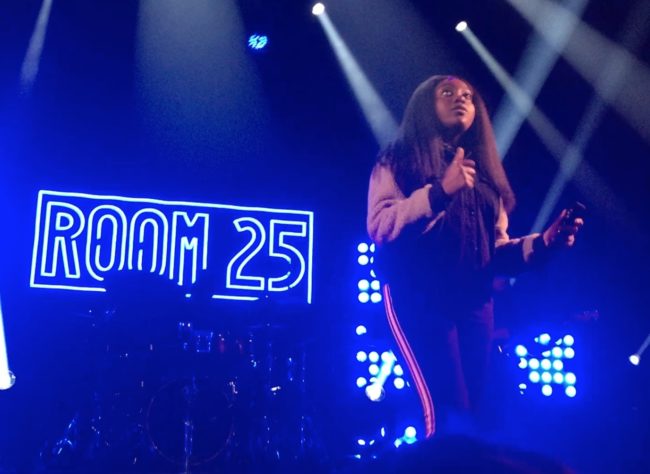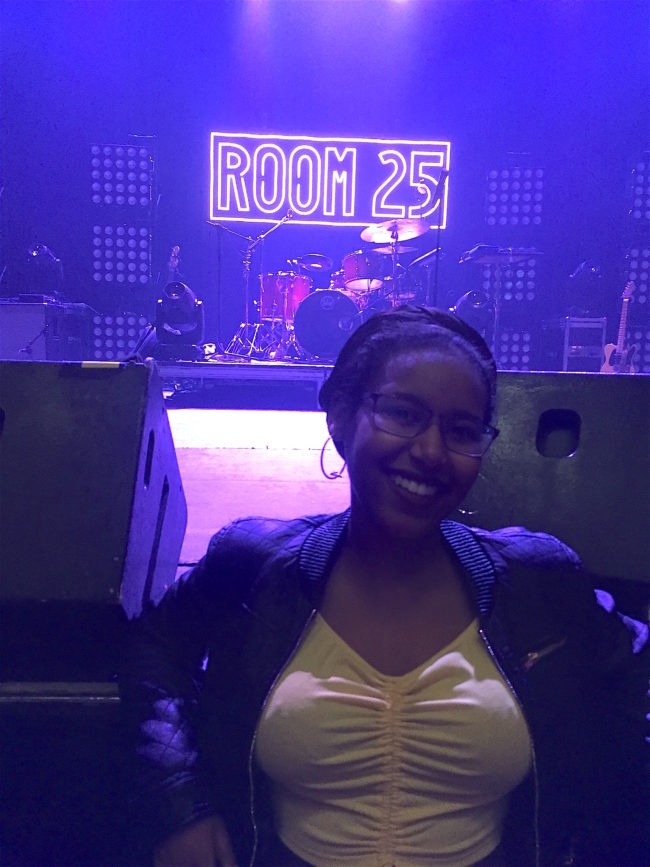The Genius of Noname’s Room 25
by
Ililli Ahmed


The months leading up to this concert have been pretty transformative for me, due in part to the many hurdles that have come my way. Since September, I’ve dealt with what seemed like unshakable insecurity, loneliness and fragility. The rush that came with starting university meant that I had no time to do the things I enjoy and rarely saw those I love. In the midst of this, listening to Noname felt like food for my soul; her ability to express her own shortcomings, growth and vulnerability with ease, especially as a Black woman, spoke to me in ways I didn’t think possible.
I first discovered Noname with her recent album Room 25 (though many friends told me to listen to her long before its release). The versatility of Noname’s music style and complex, heartfelt messages shine throughout Room 25’s eleven songs, and in honour of the best concert of my life, I’m dedicating this article to the genius that is this album.
Noname introduces Room 25 with “Self”: a song full of melodic voices and harmonies, where she declares that this body of art can be whatever you need it to be, but that ultimately, she made it for her own growth and personal journey. It’s the candid, subtle but pertinent beginning that Room 25 needed and “Blaxploitation,” the album’s second song, is equally as stunning. With its witty lyrics and word play, Noname gives her two cents concerning issues that plague Black America, from an empathetic Black female voice that many of these discussions often lack. Song number three, “Prayer Song,” follows suit on this political theme and is divided into two parts―the chorus highlighting the darkness of the American dream, especially for Black folk, and the second half describing Noname’s take on a racist police officer shooting an innocent Black person. Topics such as systemic racism and the use of religion as temporary release from society’s desensitization to Black death rise above a quick beat and Noname’s matching frantic storytelling.
Following this commentary, Noname opens up about her love life since her 2016 album Telefone, with Room 25’s fourth track “Window.” The beautiful flow of the song plays perfectly with the harmony behind her message, where she expresses the importance of empathy, self-reflection and and appreciation for those who stick by you in the midst of a failed relationship. Moving on doesn’t have to leave you resentful, Noname says: of course, that doesn’t mean it won’t hurt like hell. “Don’t Forget About Me,” the song following “Windows,” leans into this reality. Noname acknowledges that death is an inescapable truth, but prays that her impact doesn’t fade once she’s gone. She also touches on the hardships she’s faced in recent years, like the fact that her rise in fame hasn’t cured all her pre-fame problems, as well as appearance-insecurities brought by her recent move to Los Angeles. After determining that how we move in this world is forever lasting, Noname speaks of a love that feels like royalty on “Regal.”
Room 25’s seventh track “Montego Bae” (note the wordplay) emphasizes the idea of a pure, sweet love, and the tropical setting provided by Jamaica’s Montego Bay, is used by her to describe the excitement of a new romantic interest. “Ace” is another lighthearted song on the album where Noname comments on the talent of featured rappers Smino and Saba, mumble rapping and how she uses vulnerability to fuel her work. The last three songs of Room 25 are a bit more emotional, in the sense that Noname touches on sensitive topics such as not feeling good enough, as heard on “Part of Me,” loneliness and emptiness on “With You” and trying to live your life to the fullest on “no name.”
“No name” is the last song on Room 25, and was, incidentally, the last song at her concert. I will admit that the reality that I was seeing my favourite rapper live, hit me only when this song played. Something about hearing the chorus while standing front row― the same chorus that I had shed so many tears to in weeks prior― spoke to me with newfound meaning. On it, featured artist Yaw exclaims “through all the joy and all the pain, don’t forget from where you came, the avenue remembers you, your song, your truth, your light is proof, that love is still with you,” followed by Adam Ness saying that you can’t let your life pass you by. To Noname, living her best life means producing her art freely, without the strain of a capitalist music industry, that would exploit her name and image for financial gain. It also means honouring her past and present while preparing for her inevitably bright future. It was in that moment, there at the Corona Theatre, standing directly in front of Noname, that I realized what living my best life means to me. From now on, it means prioritizing my mental and emotional health above all. It means drawing healthy boundaries with those I surround myself with. Most of all, it means not losing sight of my hobbies (Black Ottawa Scene, I’m here to stay!).
With this being said: Noname, thank you for your sweet Room 25― it saved my life. I’ll see you on your next tour, birthday twin.*
*Room 25, along with Telefone, can be listened to on Spotify and Apple Music.

About the writer
Ililli Ahmed is a conflict studies and human rights student at the University of Ottawa who loves to listen to Frank Ocean and watch “The Get Down.” She has formerly written for Radio-Canada, and is the current youth editor for ‘Black Ottawa Scene.’ Ililli is also a member of the City of Ottawa’s Youth Engagement Committee. If you’re a young Black person who would like to write for Black Ottawa Scene, you can contact her at [email protected].

